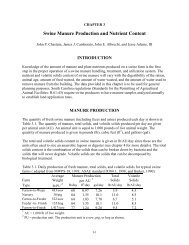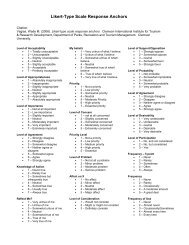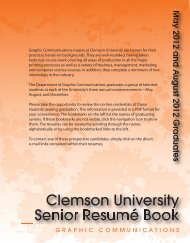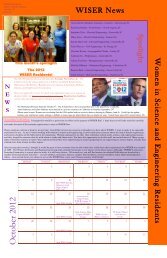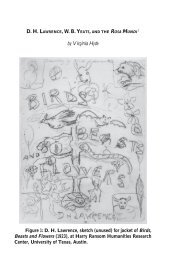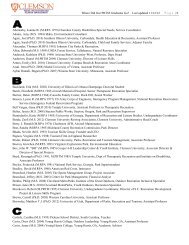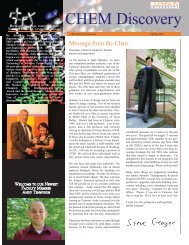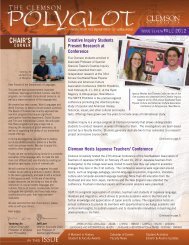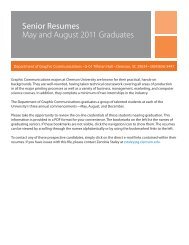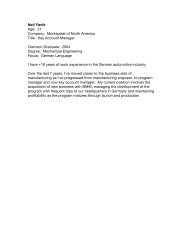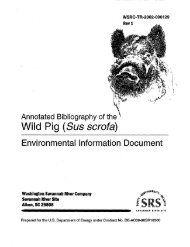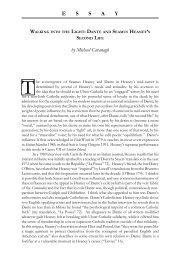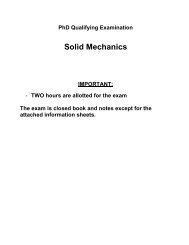Woolfian Boundaries - Clemson University
Woolfian Boundaries - Clemson University
Woolfian Boundaries - Clemson University
Create successful ePaper yourself
Turn your PDF publications into a flip-book with our unique Google optimized e-Paper software.
Woolf and Andrew Marvell<br />
(133-34); and so does the amputation done by a reaping machine in “Th e Window” (10).<br />
For those motifs remember the group of erotic lyrics known as the “Mower” poems. “Th e<br />
Mower against Gardens,” for instance, with its forced horticulture’s “Forbidden mixtures”<br />
(Marvell 41), is clearly ironized in “Time Passes.” In “Damon the Mower,” the “whistling<br />
Sythe” infl icts refl exive damage as “By his own Sythe, the Mower [is] mown” (44). Woolf<br />
also seems to have had in mind the mowers who worked the meadows around Appleton<br />
House. Th ere again, we meet those scythes, with their “Edge all bloody” from the death of<br />
birds that had been nesting in the grass (71).<br />
But maybe enough has been said to demonstrate that Woolf’s use of Marvell was far from<br />
casual, or merely incidental. She had, on the contrary, a need to appropriate and rewrite him. Th is<br />
was owing in part to the momentum towards canonisation that, as we saw earlier, had been under<br />
way for some time, and behind which Eliot was throwing his signifi cant critical weight.<br />
As I have suggested, Woolf’s uses of Marvellian lyric could be disruptive. McWhirter’s<br />
description of her allusive praxis as often “unruly” or “disorderly,” and as the enactment of<br />
fertile “instability,” seems justifi ed by what she did with Marvell (251, 260). For as we have<br />
seen, she can lift images from widely diff erent poems and create new hybrids, so as to make<br />
explicit the gendered assumptions of those verses. She is sceptical of the “tough reasonableness”<br />
Eliot credits to Marvell, which was, as she saw it, sometimes bought at women’s<br />
expense. His lyricism was easy to love, but perhaps it was too immediately attractive and<br />
gratifying. Th ere could be generous experience of his poetic charm. But in Woolf’s case this<br />
was not uncritical. It was accompanied by a strong sense of his imaginative limits, especially<br />
in the stances his poetic voice assumed towards women. Her writing-large of those assumptions,<br />
and her atomising and reassigning of his imagery, signal a deeper rebellion against<br />
facile assimilation of Marvell into any ideal artistic order, Eliot’s included; and amounts to a<br />
contesting, through fi gure, and by proxy, of Eliot’s critical authority.<br />
Works cited<br />
Bagguley, W. H., ed. Andrew Marvell 1621-1678: Tercentenary Tributes. Oxford: Oxford UP, 1922.<br />
Birrell, Augustine. Andrew Marvell. London: Macmillan, 1905.<br />
Browne, Sir Th omas. Th e Major Works. Ed. C. A. Patrides. Harmondsworth: Penguin, 1977.<br />
——. Sir Th omas Browne’s Pseudodoxia Epidemica. Ed. Robin Robbins. Vol. 1. Oxford: Clarendon, 1981.<br />
de Gay, Jane. Virginia Woolf’s Novels and the Literary Past. Edinburgh: Edinburgh UP, 2006.<br />
Dusinberre, Juliet. Virginia Woolf’s Renaissance. London: Macmillan, 1997.<br />
Eliot, T. S. Selected Prose of T. S. Eliot. Ed. Frank Kermode. London: Faber, 1975.<br />
——. Th e Waste Land: A Facsimile and Transcript of the Original Drafts Including the Annotations of Ezra Pound.<br />
Ed. Valerie Eliot. London: Faber, 1971.<br />
Fox, Alice. Virginia Woolf and the Literature of the English Renaissance. Oxford: Clarendon, 1990.<br />
Greene, Sally. Virginia Woolf: Reading the Renaissance. Athens, OH: Ohio UP, 1999.<br />
MacCarthy, Desmond. “Aff able Hawk”. New Statesman 2 April 1921: 757.<br />
McWhirter, David. “Woolf, Eliot, and the Elizabethans: Th e Politics of Modernist Nostalgia.” Virginia Woolf:<br />
Reading the Renaissance. Ed. Greene. 245-66.<br />
Marvell, Andrew. Th e Poems & Letters of Andrew Marvell. In Two Volumes. Vol. 1. Ed. H. M. Margoliouth.<br />
Oxford: Clarendon, 1927.<br />
Sackville-West, Vita. Andrew Marvell. London: Faber, 1929.<br />
Woolf, Virginia. Mrs. Dalloway. Introd. Elaine Showalter. London: Penguin, 1992.<br />
——. Th e Diary of Virginia Woolf. Ed. Anne Olivier Bell with Andrew McNeillie. Vols 1 and 2. Harmondsworth:<br />
Penguin, 1979, 1981.<br />
——. To the Lighthouse. Ed. Susan Dick. Oxford: Shakespeare Head, 1992.<br />
——. Th e Waves. Ed. Gillian Beer. Oxford: Oxford UP, 1998.<br />
35



